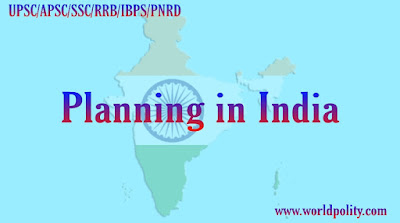Objective Questions on Planning & Economic Development
"Planning in India Objective Questions" is one among the foremost relevant and important parts of the Exams like UPSC/APSC/SSC/RRB/IBPS/PNRD and lots of other national and state level Competitive Exams. Therefore "World_Polity" provides a set of Planning in India Objective Questions in the sort of Practice sets contains 20 Planning multiple choice questions and answers which will be a pedestrian to crack your exams.
UPSC Questions on planning
• What is Planning ?
Planning is the fundamental function of a country, which involves deciding beforehand, what is to be done, when is it to be done, how it is to be done and who is going to do it. Planning is a systematic regulation of purposeful activity to achieve national goals.
• Planning in India :
After independence in 1950, the Planning Commission was set-up under the chairmanship of Pt Jawaharlal Nehru. It was to formulate plans for the economic development of the country on the basis of the available physical, capital and human resources. The country’s first five-year plan was launched in 1951.
Questions on Planning in India
1. The Planning Commission was established in the year
a) 1947
b) 1948
c) 1950
d) 1965
Answer: C
2. The first Five Year plan started on
a) 1950
b) 1951
c) 1965
d) 1991
Answer: B
3. Planning Commission was scrapped on
a) 2015
b) 2014
c) 2017
d) 2012
Answer: B
4. Formation of NITI AYOG was announced in
a) 15th August 2015
b) 15th August 2014
c) 26th January 2015
d) 26th January 2014
Answer: B
5. NITI AYOG was established on
a) 15th August 2015
b) 26th January 2015
c) 2nd October 2015
d) 1st January 2015
Answer: D
6. Which of the following is not a feature of Indian planning
a) Development planning
b) Indicative planning
c) Democratic planning
d) Centralized planning
Answer: D
7. “GRAND INNOVATION CHALLENGE” was launched by
a) NITI Aayog
b) Planning Commission
c) National Planning Committee
d) Finance Commission
Answer: A
8. Full form of NITI Aayog is
a) National Institute for Transforming India
b) National Institution for transforming India
c) National Institute for Transmitting India
d) None of the above
Answer: B
9. Who amongst the following is the chairperson of NITI Aayog
a) The President
b) The Prime Minister
c) The Union Minister
d) The Finance Minister
Answer: B
10. Who appoints the Vice-Chairperson of NITI Aayog
a) The Prime Minster
b) The President
c) The Chief Executive Officer
d) The Union Minister
Answer: A
Join our telegram channel - CLICK HERE
11. Number of part-time members in NITI Aayog is
a) 5
b) 10
c) Not exceeding 2
d) 2
Answer: C
12. The concept of Participatory Development was introduced in
a) 1980s
b) 1970s
c) 1950s
d) 2000s
Answer: B
13. Engagement of local people in development project refers to
a) Economic Development
b) Social Development
c) Participatory Development
d) Sustainable Development.
Answer: C
14. The entire process of participatory development can be completed in
a) 4 stages
b) 5 stages
c) 2 stage
d) 3 stages
Answer: A
15. The form of Participation where the primary stakeholders participate in the discussion and analysis of pre-determined objectives is called
a) Empowerment participation
b) Participation by collaboration
c) Participation by consultation
d) Passive participation
Answer: B
16. The father of Indian planning is
a) Jawahar lal Nehru
b) Mahatma Gandhi
c) B.R. Ambedkar
d) M. Vishveshshwariah
Answer: D
17. A rolling plan refers to a plan which
a) Does not change its target every year
b) Changes its allocation every year
c) Changes its allocation and target every year
d) Changes only its target every year
Answer: C
18. What was the main theme of the 12th five-year plan of India
a) Faster and more inclusive growth
b) Faster, More Inclusive and Sustainable Growth
c) Growth with justice and equity
d) Sustainable development
Answer: B
19. What was the growth target of the 12th five-year plan of India?
a) 7.8%
b) 7%
c) 8.5%
d) 8%
Answer: D
20. Who was the last deputy chairman of the Planning Commission?
a) Dr. Manmohan Singh
b) C. Rangarajan
c) Montek Singh Ahluwalia
d) Shri Pranab Mukherjee
Answer: C
* Bonus :
21. Twenty Point Programme" was launched in the year?
a) 1969
b) 1975
c) 1977
d) 1980
Answer: D
Planning in India Objective Questions Set 2 - Click Here
Must visit : Planning Commission of India for APSC
Must visit : GK Questions and Answers on NITI AAYOG
Download General Knowledge E-book for Competitive Exam - Click Here
* Most Related Searches :
* Key Highlights of Union Budget 2021-22














0 Comments
(Please do not enter any spam link in the comment box)